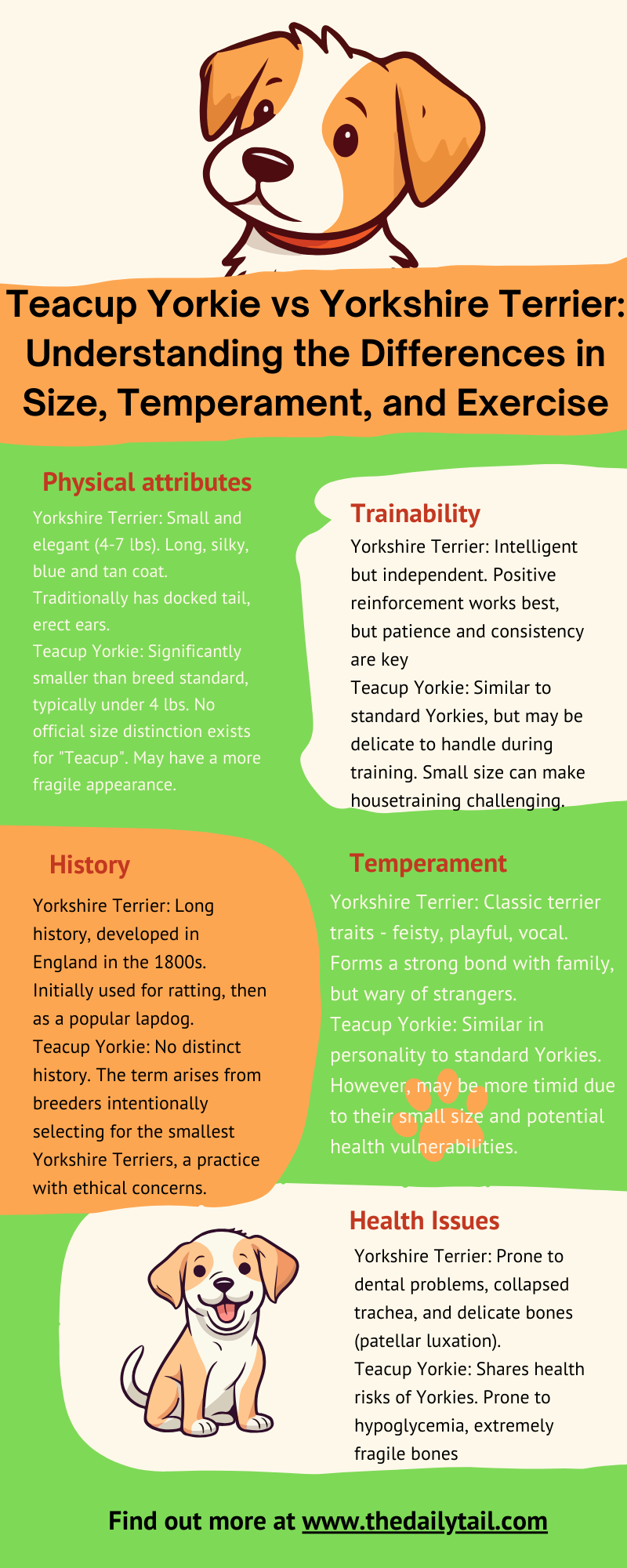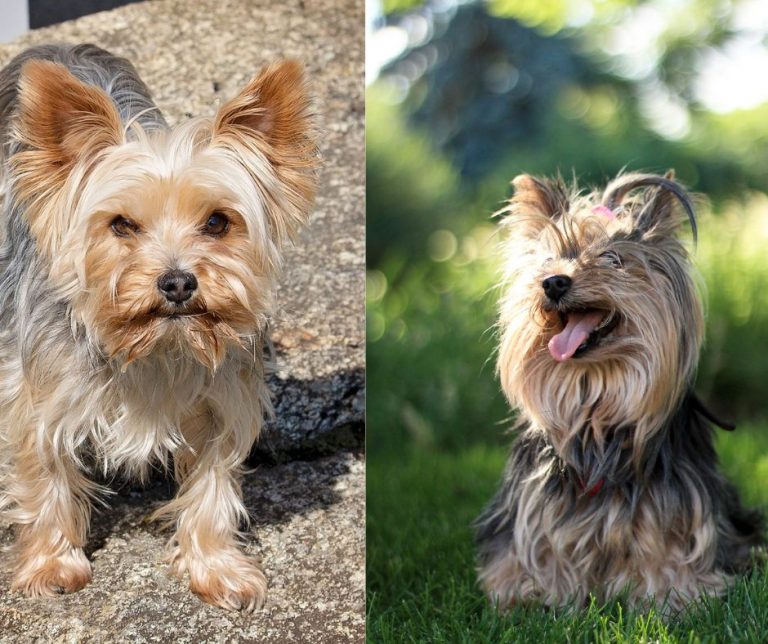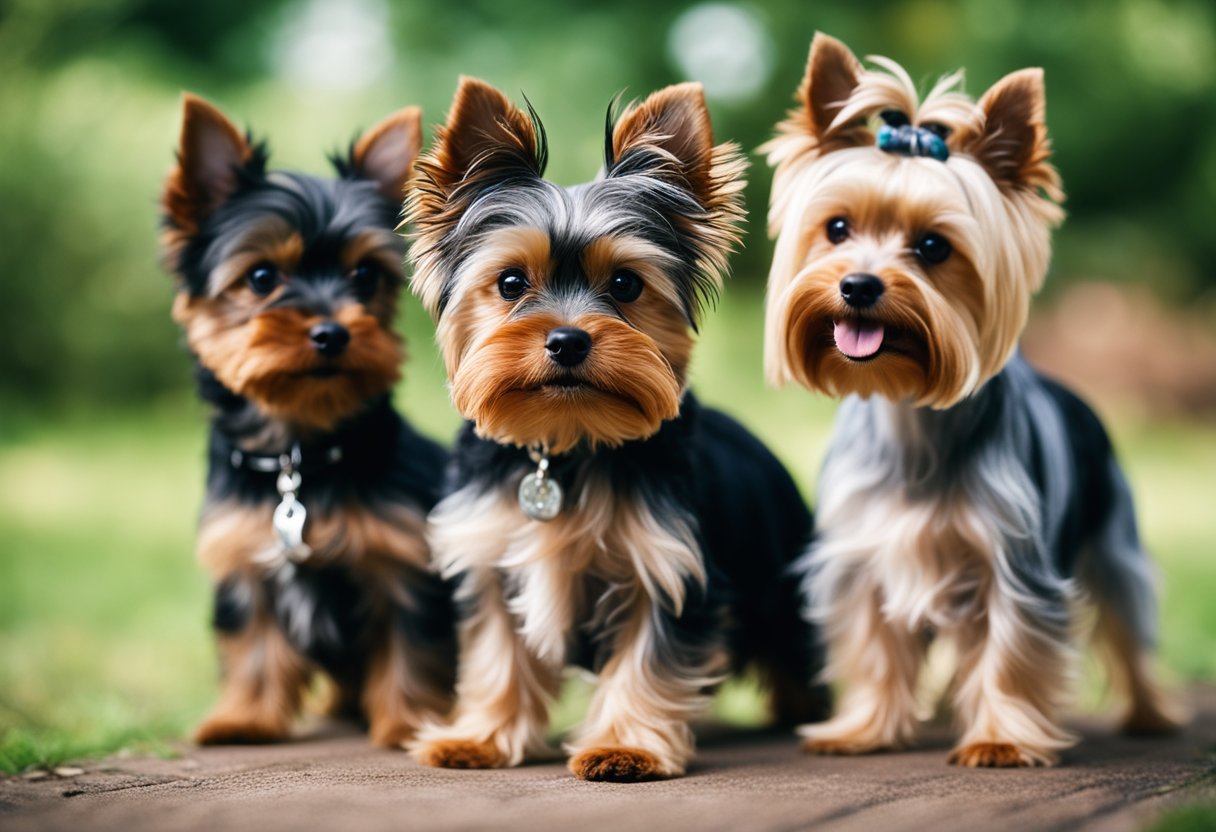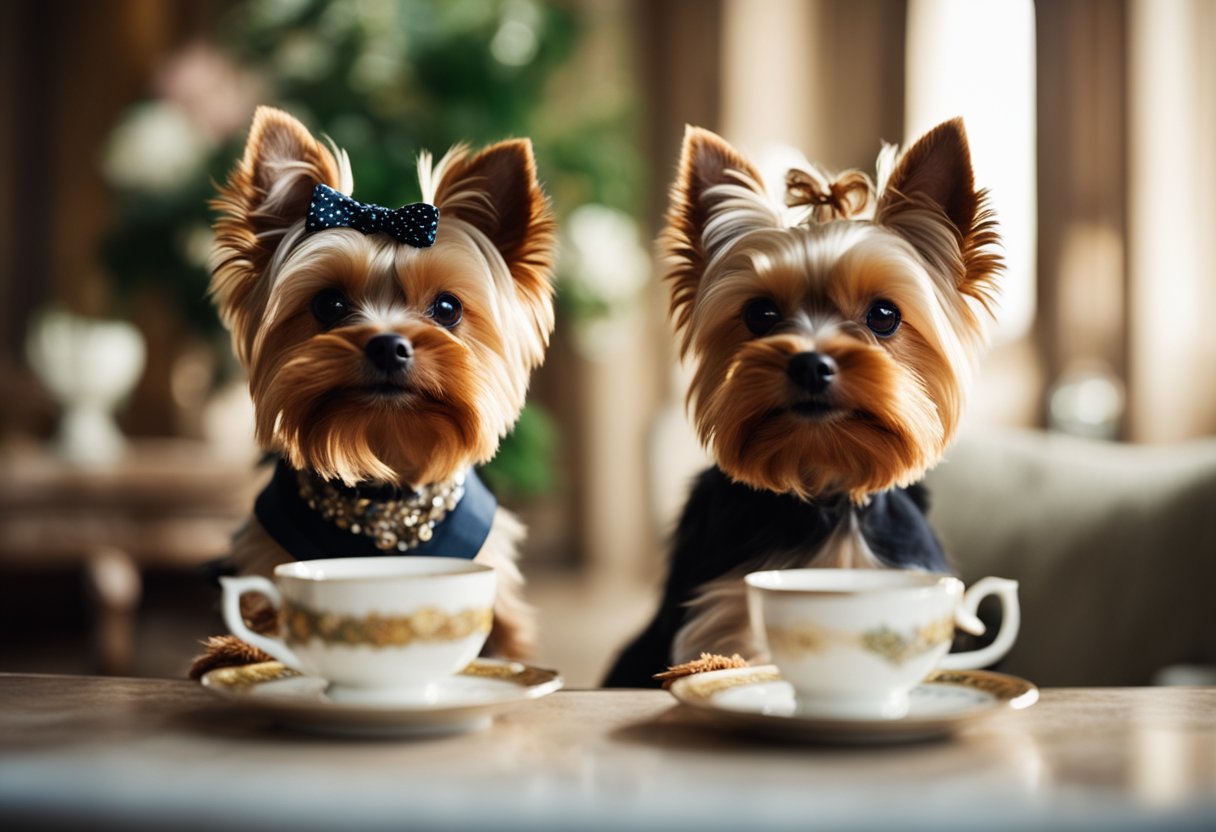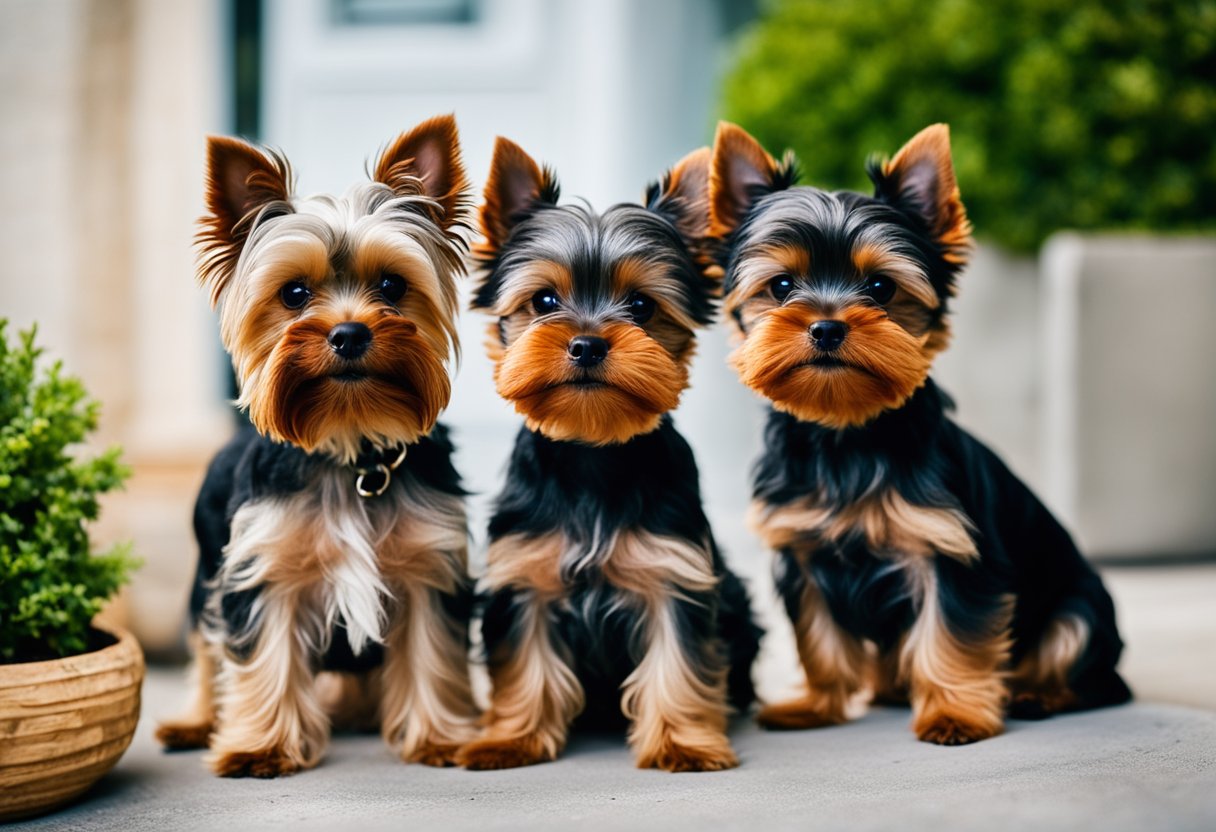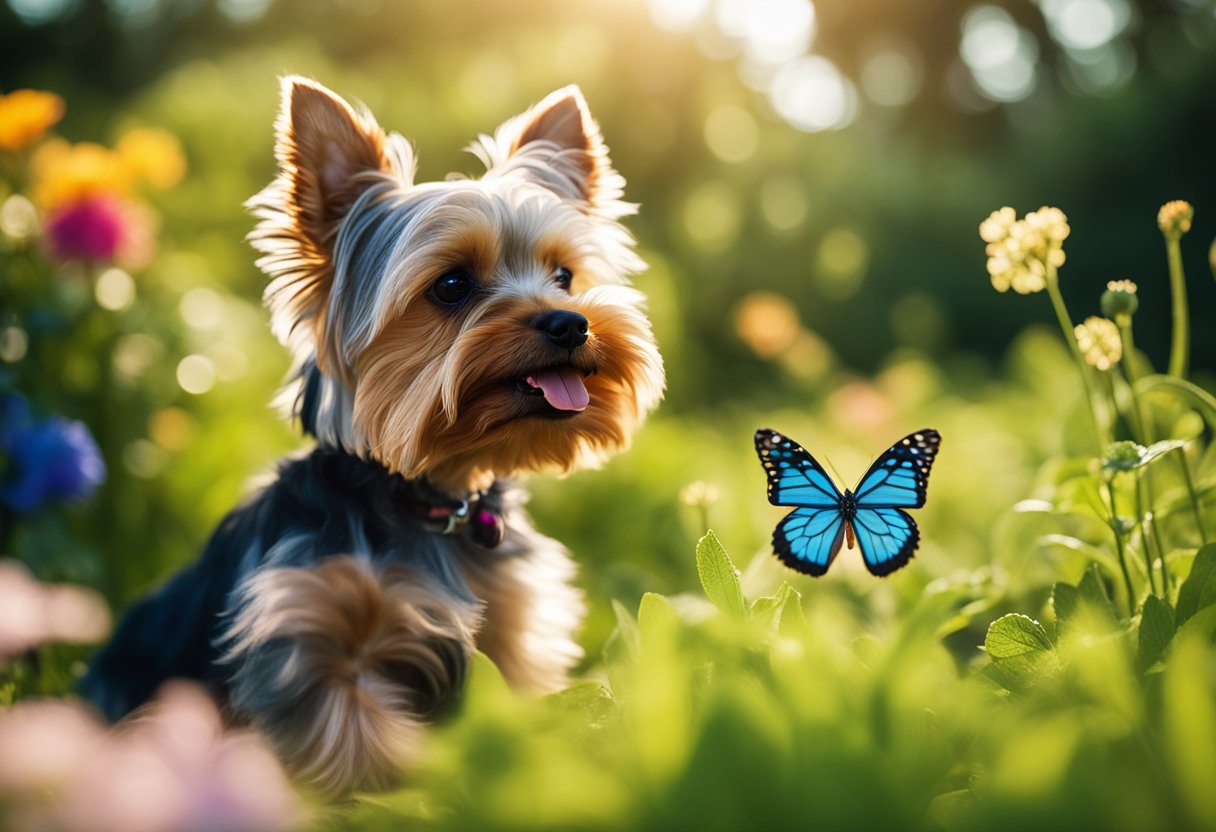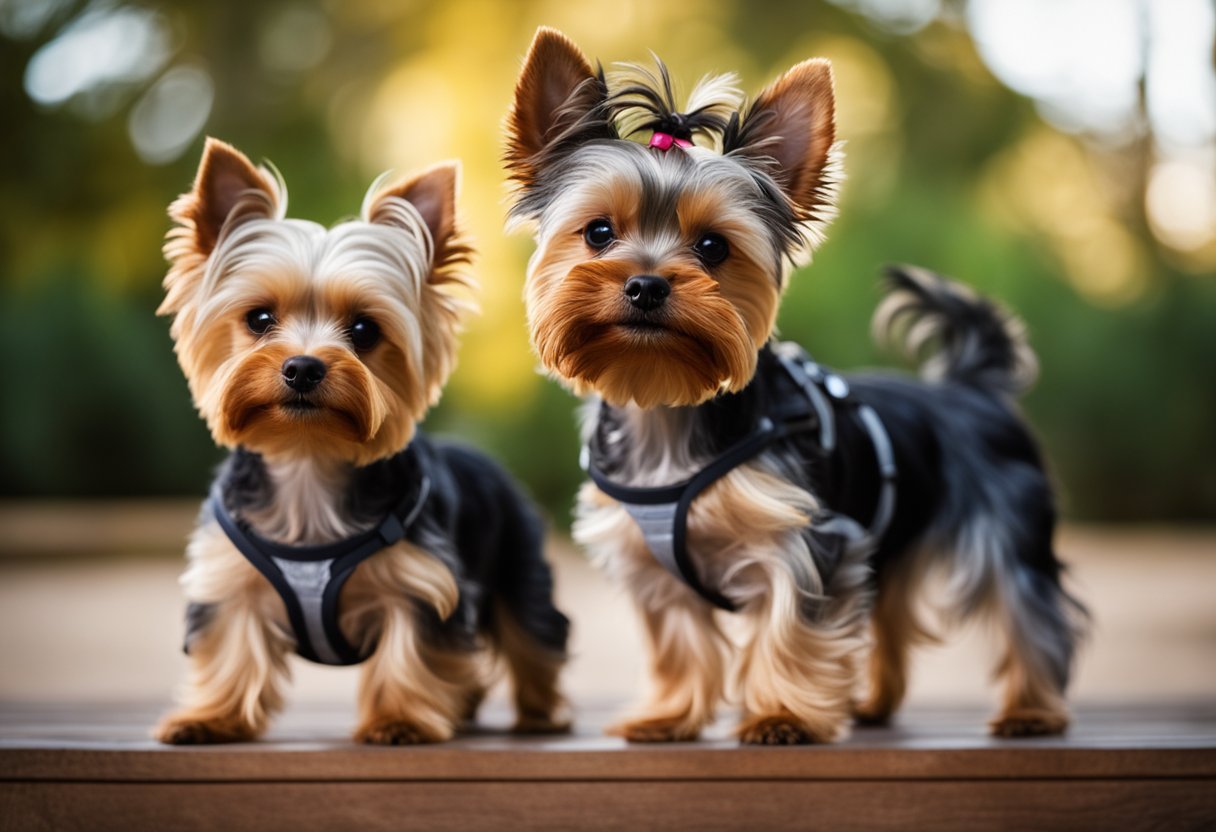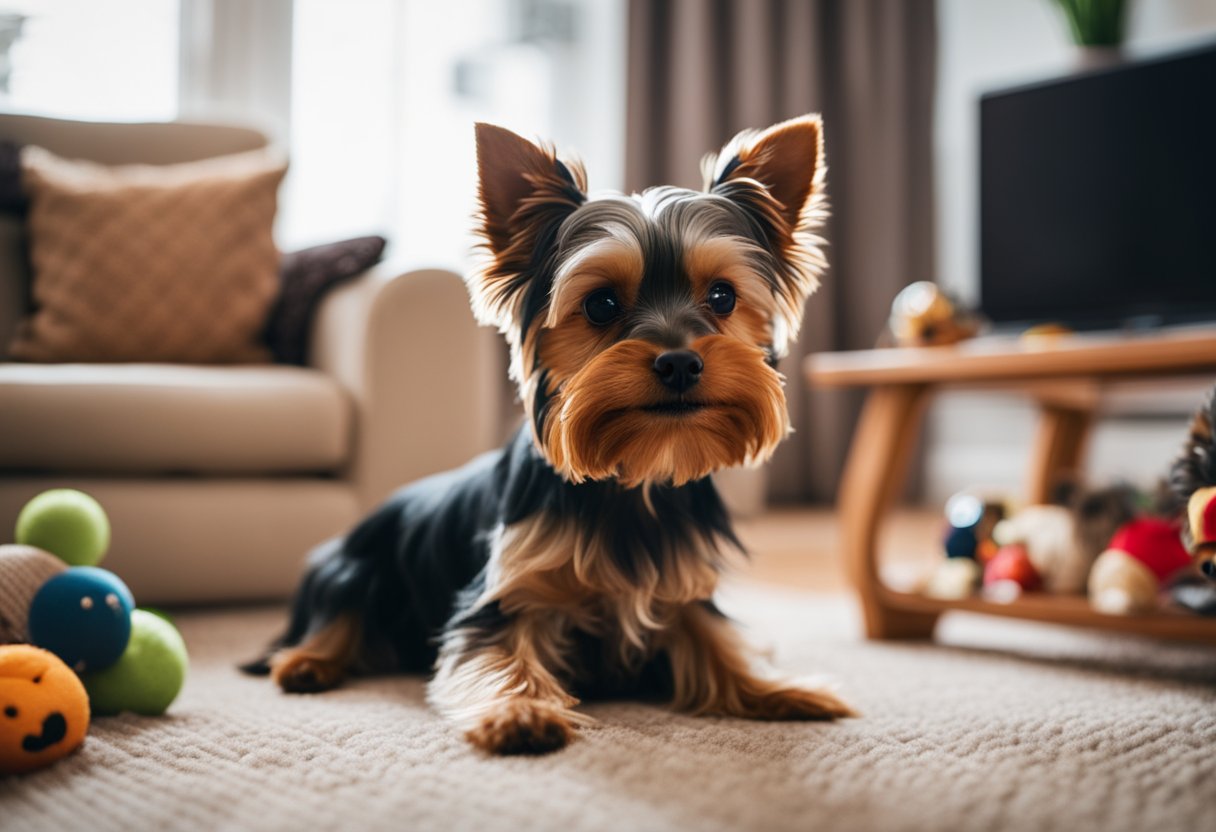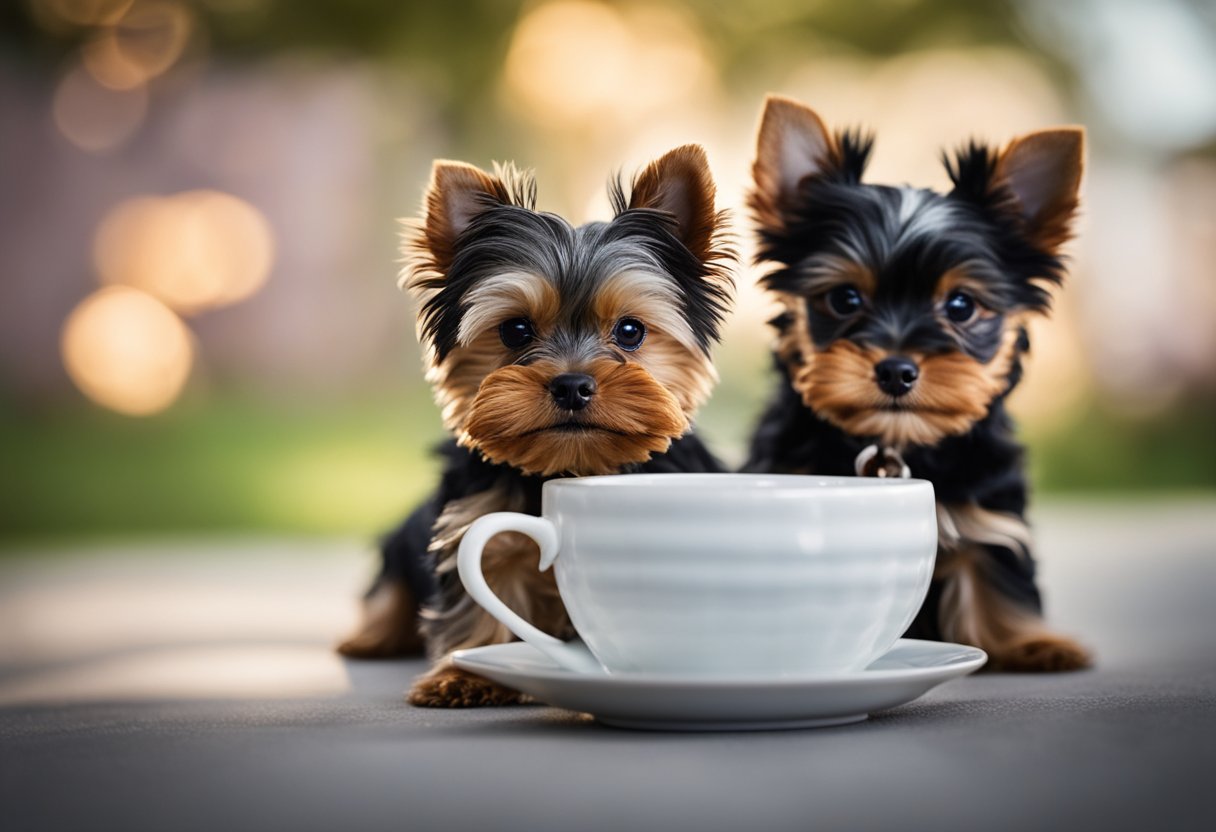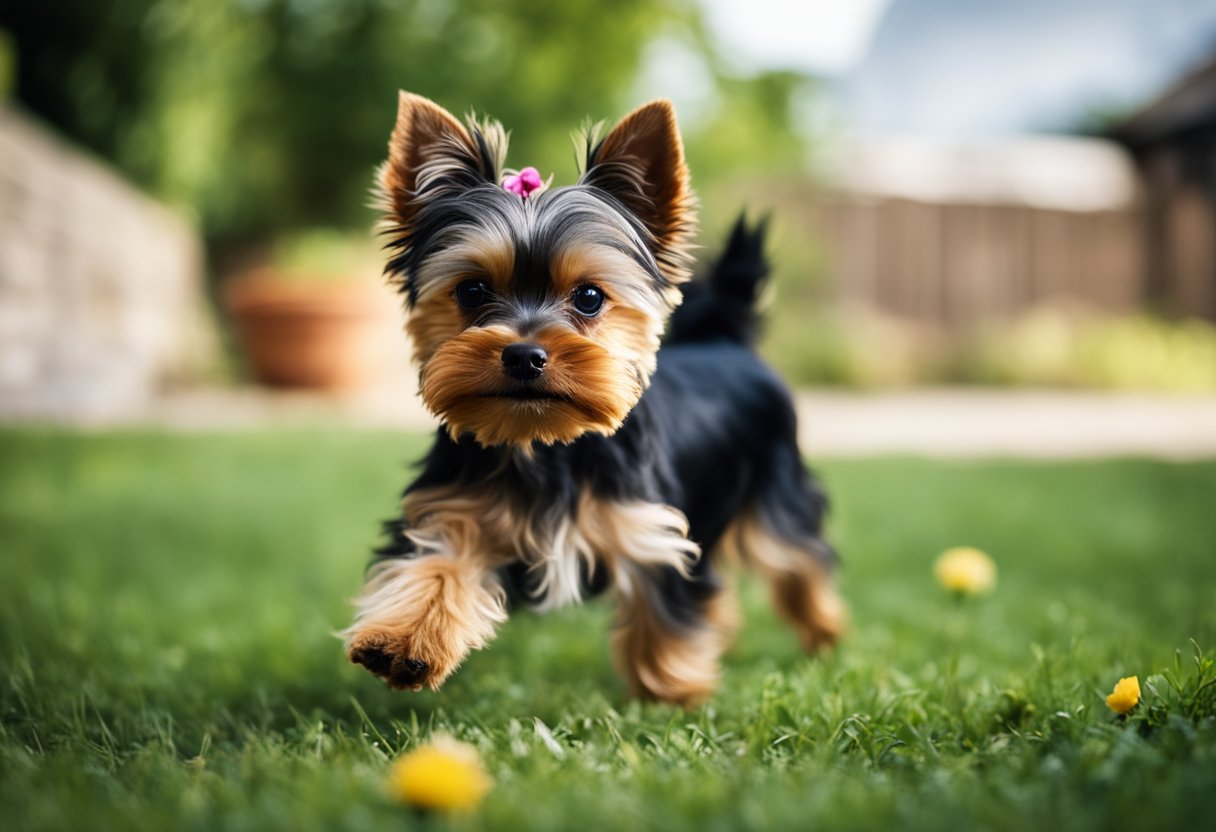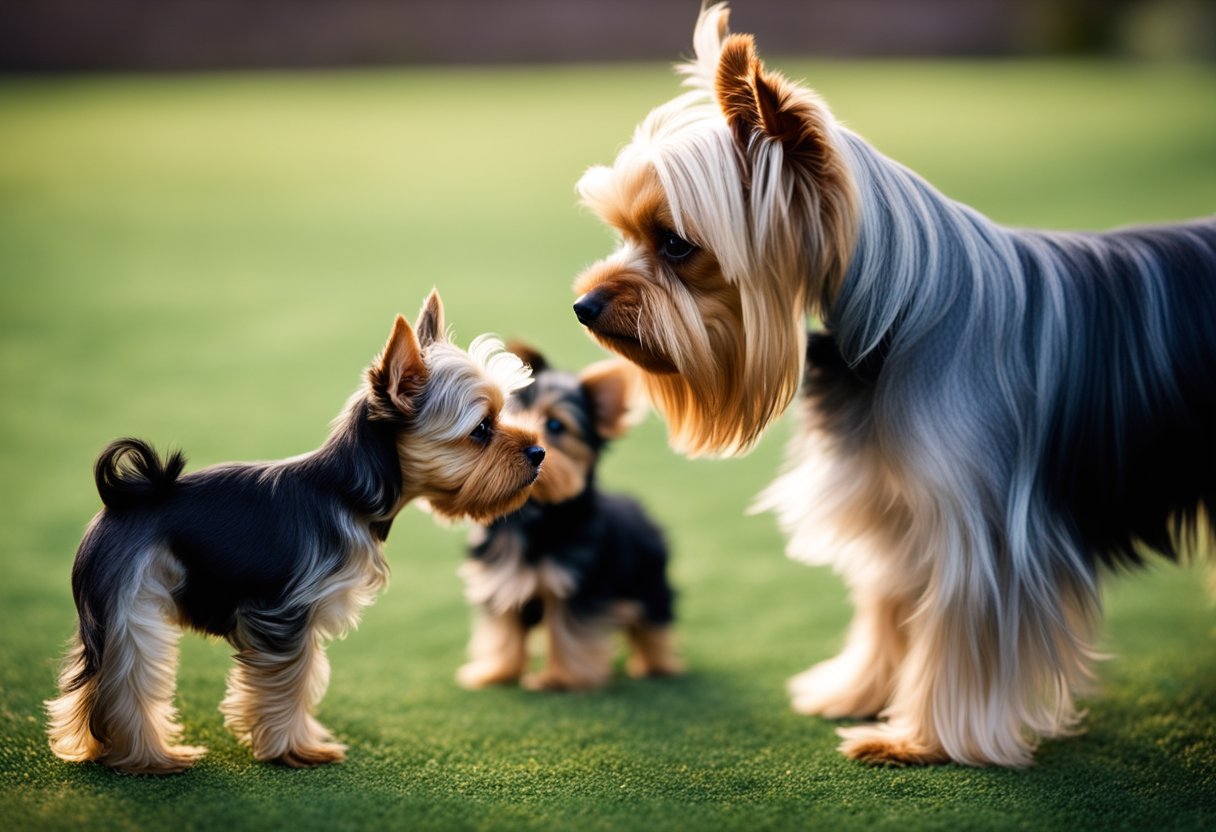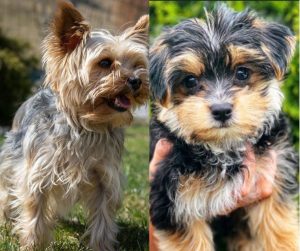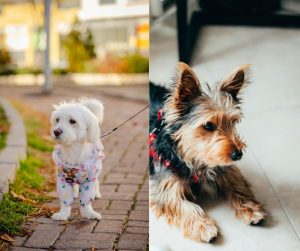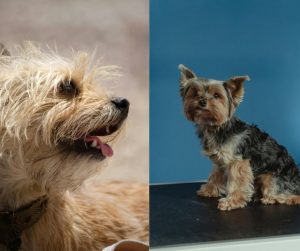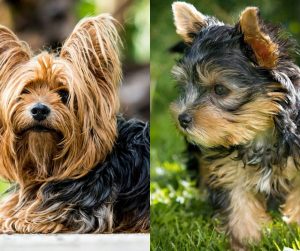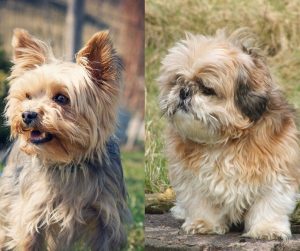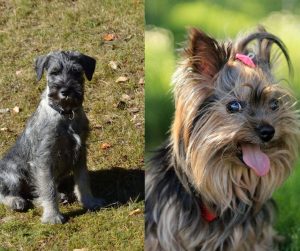As a long-time dog owner, I know the ‘Teacup Yorkie’ label throws people off. Let’s clear up the confusion and why it matters for responsible dog ownership.
Yorkshire Terriers, affectionately known as Yorkies, are a popular breed recognized for their vivacity, small size, and luxurious coat. Within this breed subset lies an even tinier version, often referred to as the Teacup Yorkie. The main difference between a standard Yorkie and a Teacup Yorkie lies in their size. Standard Yorkies adhere to breed specifications set by kennel clubs like the AKC, which generally list a maximum weight of 7 pounds and a height ranging from 7 to 8 inches at the shoulder.
Teacup Yorkies, on the other hand, are bred to be smaller than the breed standard, usually weighing between 2 to 4 pounds. Despite their smaller stature, Teacup Yorkies share the confident and spirited temperament of their larger counterparts. They carry the signature characteristics of the Yorkshire Terrier’s coat, color, and personality within a more petite frame. However, they are not officially recognized as a separate breed by major kennel clubs. Today, we will talk about the breed comparison between Teacup Yorkie vs Yorkshire Terrier.
Prospective dog owners often consider the Teacup Yorkie for its compact size, which can be advantageous for those living in smaller spaces. It is crucial, however, for potential owners to understand the care needs and health implications that may accompany owning a dog of such small size. Those considering adding a Yorkie to their life must weigh the differences between the standard and Teacup varieties to ensure they choose a pet well-suited to their lifestyle and environment.
Love the Yorkie spirit but unsure about the ‘Teacup’ trend? As an experienced owner, let’s explore what size really means for this breed.
Teacup Yorkie vs Yorkshire Terrier Overview
The Teacup Yorkie and Yorkshire Terrier are breeds that captivate with their diminutive size and dynamic personalities. Despite common ancestry, they present notable differences largely centered around size and health.Size:
- Yorkshire Terrier: Averages 7-8 inches in height, weighing between 4 and 7 pounds
- Teacup Yorkie: Typically less than 7 inches tall, with a weight under 4 pounds
Breed Characteristics:
- Both types boast a silken coat that grows fine and long
- Traditional coat colors include blue and tan, which the Kennel Clubs recognize widely
Teacup Yorkie:
- Referred to as ‘Teacup’ due to their extraordinarily small size
- Fall into a subcategory of ‘Toy’ breeds, yet unofficially recognized as an independent breed
- May also be labeled as ‘Mini’ or ‘Micro’ yorkies
Health:
- Teacup Yorkies are known to face more health issues due to their tiny stature, shortened lifespan being a significant concern
- Regular Yorkshire Terriers generally enjoy better health compared to their Teacup counterparts
The two breeds share many characteristics typical of the terrier group but are suited to different lifestyles due to their size. Potential owners should consider their living space, time, and ability to handle the health needs specific to each breed size. The distinction between the Teacup Yorkie and the Yorkshire Terrier remains rooted in the fundamental variance of weight and height, impacting life expectancy and overall well-being.
Historical Background
Yorkshire Terriers have a rich history that traces back to the 19th century, with Teacup Yorkies being a modern miniaturized variation of the breed. While the breeding of Teacup Yorkies isn’t officially recognized, the development of Yorkshire Terriers is well documented.
Origin of Teacup Yorkies
Teacup Yorkies are not a separate breed but are Yorkshire Terriers selectively bred to achieve a smaller size. Breeders aiming to create these tiny dogs often pair the smallest individuals from litters, focusing on miniaturization within the breed standard’s framework. However, there is no official recognition for Teacup Yorkies from established canine registries, and they do not have a distinct history as their size is a result of recent breeding practices.
Development of Yorkshire Terriers
Yorkshire Terriers originated in 19th century England, developed by mill workers who wanted a small, agile dog capable of catching vermin. The breed evolved from a few different terrier breeds, such as the Toy Terrier and the Broken-Haired Scotch Terrier. Officially named the Yorkshire Terrier in 1874, they were recognized by the Kennel Club in England, becoming popular amongst Victorian high society. As a part of the toy breeds category, Yorkshire Terriers have been bred to adhere to a breed standard which, according to the American Kennel Club (AKC), stipulates that a Yorkshire Terrier should not exceed seven pounds.
Physical Characteristics
The Teacup Yorkie and Yorkshire Terrier differ significantly in their physical makeup, particularly in size and coat characteristics. Understanding these distinctions is essential for prospective owners to make an informed decision.
Size and Weight Comparison
- Teacup Yorkie:
- Size: Ranges from being significantly smaller than Yorkshire Terriers
- Weight: Typically between 2 and 4 pounds, but can weigh up to 7 pounds
- Yorkshire Terrier:
- Size: Height usually stands at about 7-8 inches
- Weight: Hits a maximum of around 7 pounds, aligning with American Kennel Club standards for the breed
Coat and Color Variations
- Teacup Yorkie:
- Coat: Similar to larger Yorkies, they possess a fine, silky coat
- Color: Although coat color can vary, they often display the classic blue and tan colors associated with the dog breed
- Yorkshire Terrier:
- Coat: The coat is typically fine, glossy, and straight, requiring regular grooming
- Color: The breed’s standard colors include a dark steel blue and tan, with the blue extending from the back of the neck to the tail
Both variations belong to the toy group, with the Teacup Yorkie being a miniature or “teacup” version of the Yorkshire Terrier. The size and weight differences are mainly due to selective breeding to achieve a smaller stature.
Personality and Temperament
Yorkshire Terriers, commonly known as Yorkies, and Teacup Yorkies share much of the same engaging personality. They are spirited, affectionate, and eager for adventure. Yorkies, regardless of size, make for spirited companions known for their bravery, which often belies their small stature.Teacup Yorkie Temperament:
- Affectionate: They crave human companionship and form strong bonds
- Inquisitive: Despite their size, they are adventurous and curious
- Vocal: Like many small dogs, they can be quite vocal, often using their bark to communicate
Yorkshire Terrier Temperament:
- Confident: Yorkies carry themselves with a self-assured attitude
- Intelligent: They are quick learners and respond well to training
- Alert: This breed is naturally vigilant and can be an effective watchdog
Both types thrive in a family environment but could be overwhelmed by rough play due to their diminutive size. Early socialization is key to ensuring they are well-rounded and adaptable. Due to their tiny size, Teacup Yorkies can be more delicate and may be better suited for households without small children.
Companionship is a cornerstone of both Yorkies and Teacup Yorkies’ temperament, making them excellent pets for those looking for a small but hearty companion. As toy breeds, they fit well into various lifestyles, although their energy levels require regular playtime and interaction.
In conclusion, whether considering a Yorkshire Terrier or its even smaller counterpart, the Teacup Yorkie, potential owners should prepare for a toy breed that is lively, loyal, and full of personality. Proper care, training, and socialization will harness their best qualities and ensure these mini companions live up to their reputation as delightful pets.
Health and Lifespan
When comparing the Teacup Yorkie to the traditional Yorkshire Terrier, distinct differences in health and lifespan stand out. The Teacup variety faces greater health challenges and typically has a shorter life expectancy.
Common Health Issues
Teacup Yorkies and Yorkshire Terriers share some health problems due to their genetic similarities, yet the Teacup’s diminutive size predisposes it to certain conditions. Yorkshire Terriers may encounter:
- Hypoglycemia: Low blood sugar levels which can lead to weakness and lethargy
- Collapsed Trachea: A condition where the tracheal rings collapse, leading to respiratory issues
- Luxating Patella: A knee joint problem where the patella moves out of its normal location
- Liver Shunts: Abnormal blood flow around the liver instead of through it
- Hydrocephalus: Also known as “water on the brain,” this can affect smaller breeds like the Teacup Yorkie
The hypoallergenic coat of the Yorkshire Terrier benefits individuals with allergies, as it tends to produce fewer allergens than other breeds.
Factors Affecting Life Expectancy
Factors influencing the life expectancy of Teacup Yorkies compared to standard Yorkshire Terriers include:
- Size and Breeding: Teacup Yorkies generally live 7 to 9 years, shorter than the 12 to 15 years of their larger counterparts, partly due to the stresses of their smaller size
- Health Challenges: The Teacup variety is more prone to trauma and health issues associated with their miniature stature, such as accidental injuries and congenital defects
- Proper Care: Adequate nutrition, regular veterinary check-ups, and avoidance of injury are critical for extending the life of a Teacup Yorkie
In summary, while both breeds share certain hereditary health concerns, the Teacup’s reduced size contributes to a heightened risk for certain health issues and a generally shorter life expectancy.
Care Requirements
Caring for Teacup Yorkies as opposed to standard Yorkshire Terriers involves greater attention to detail due to their smaller size and unique needs.
Grooming and Maintenance
Teacup Yorkies require regular grooming to maintain their long, silky coats. They should be brushed daily to prevent matting and knots. It’s also important to keep their nails trimmed and provide regular dental hygiene. These dogs do not shed much, but their hair can grow continuously and will require trimming.
- Daily Brushing: Prevents tangles and matting
- Regular Haircuts: Keeps the coat manageable and clean
- Nail Trimming: Prevents overgrowth and walking difficulties
- Dental Care: Essential to prevent tooth decay and gum disease
Diet and Nutrition
A Teacup Yorkie’s diet should be rich in high-quality protein and easily digestible to accommodate their sensitive stomachs. They need to be fed small, frequent meals to prevent hypoglycemia, a common health condition in smaller breeds that can lead to energy dips and health issues.
- High-Quality Protein: Sufficient for growth and repair
- Small, Frequent Meals: Typically 3-4 times a day to sustain energy
- Fresh Water: Always available to support digestion and hydration
- Careful Observation: Monitor for any signs of dietary allergies or sensitivities
Exercise Needs
Although Teacup Yorkies are small, they still require daily exercise to maintain their health and prevent boredom. Short walks and indoor play sessions are sufficient to meet their exercise needs. Owners must be attentive to their small stature and prevent overexertion, as they can easily tire and are more prone to injuries.
- Short Walks: Ideally two 10-minute walks per day
- Playtime: Engage in light play that doesn’t cause stress on their delicate frames
- Supervised Activity: Keep a watchful eye during exercise to prevent injuries
Breeding and Adoption
When considering acquiring a Teacup Yorkie or a Yorkshire Terrier, potential owners must understand the practices involved in breeding these dogs, as well as the adoption process. The choice between working with breeders or adopting from rescues can have significant implications for the health and well-being of the dog.
Working with Breeders
Reputable breeders prioritize the health and temperament of the Yorkshire Terrier, including its Teacup variety, which is achieved through deliberate miniaturization. When choosing a breeder, one should ensure that they are recognized for following ethical breeding practices and that they are possibly affiliated with breed clubs or organizations.
- Ethical Considerations: Look for breeders who provide thorough health clearances and are transparent about the lineage and potential health risks associated with miniaturization
- Visitations: A willingness to let visitors observe the puppies and their living conditions is a sign of a trustworthy breeder
Miniaturization: This process should be undertaken with care to avoid health issues. Breeders should aim to achieve the small size through selective breeding of the smallest healthy dogs, not through methods that compromise the dog’s well-being.
Adopting from Rescues
Adoption offers an alternative to buying from breeders and often involves rescuing a dog that needs a new home. Organizations such as Save A Yorkie Rescue and United Yorkie Rescue are dedicated to rehoming Yorkshire Terriers and Teacup Yorkies.
- Process: Adoption involves selecting a dog from a rescue organization, completing an application, possibly undergoing a home visit, and paying an adoption fee
- Benefits: Adopting can save a dog’s life and offer a loving home to a Yorkshire Terrier that may not meet the recognized breed standard but still deserves care and affection
By choosing either to work with ethical breeders or to adopt from rescues, prospective owners play a part in promoting responsible practices that safeguard these dogs’ health and happiness.
Cost Factors
When considering the purchase of a Yorkshire Terrier or a Teacup Yorkie, one must carefully assess both the initial price range and the expected long-term costs associated with owning such a tiny dog breed. These factors can significantly affect the total cost of ownership.
Price Range and Initial Costs
Yorkshire Terriers generally command a price from $800 to $1,500. This typically covers a puppy that is kennel club registered, ensuring a certain standard of breeding. On the other hand, Teacup Yorkies, a mini version of the Yorkshire Terrier, are priced higher due to their desirable tiny size. Potential owners can expect to pay between $1,000 and $3,000 for a Teacup Yorkie from reputable breeders. The top-tier of these dogs, particularly ones that come from show-winning bloodlines or are American Kennel Club champions, can reach prices up to $10,000. Initial costs also include essential items such as a crate, bedding, food, and initial veterinary expenses including vaccinations and spaying or neutering.
Long-Term Ownership Costs
Ownership costs for these breeds extend beyond the initial purchase. Despite their small size, both Teacup Yorkies and standard Yorkshire Terriers can incur considerable expenses over their lifetime. Owners should budget for annual veterinary checkups, quality dog food without fillers, grooming, and potential health issues specific to tiny dog breeds. Regular grooming is particularly important to maintain their coat and overall health, and this can be a recurring cost if professional grooming services are used. Additionally, Teacup Yorkies may require special care due to their smaller size and potentially fragile health, which could add to the total cost of long-term care.
Social Factors and Lifestyle
Choosing between a Teacup Yorkie and a Yorkshire Terrier involves considering their social needs and the lifestyle they are best suited for. This section provides insight into how each adapts to living with other pets and within a family environment.
Integration with Other Pets
Teacup Yorkies may have challenges when integrating with other pets, especially larger dogs, due to their diminutive size and fragile nature. They typically weigh between 2 and 4 pounds, making them more vulnerable to injury during play. Yorkshire Terriers are small dogs but more robust than Teacup Yorkies, allowing for safer interaction with a variety of pet sizes. Successful integration with other pets hinges on careful socialization and training from a young age to ensure they can coexist harmoniously.
Teacup Yorkies as Family Pets
Teacup Yorkies can be affectionate companions, yet their petite stature requires families to handle them gently. They may not be ideal for families with young children who may inadvertently harm them. Yorkshire Terriers, however, adapt better to family life due to their sturdier build. Regardless of size, these dogs can exhibit frequent barking, which can be curbed with consistent training. Both Yorkies and Teacup Yorkies relish attention from their family members and can flourish in an environment where they feel loved and secure.
Pop Culture and Media Influence
The Teacup Yorkie and Yorkshire Terrier breeds have each carved out their own niche in popular culture. This section explores the levels at which these diminutive dogs have influenced celebrity choices and media representation.
Celebrity Influence
Celebrities’ affinity for the tiny and fashionable Teacup Yorkie, along with other breeds such as the Teacup Chihuahua and Teacup Pomeranian, has amplified the fascination with these pets. Notable figures are often spotted with their diminutive companions at public outings and on social media, leading to an increase in the appearance and popularity of these breeds:
- Teacup Chihuahua: Prominently featured in the arms of celebrities, bolstering its status
- Teacup Pomeranian: Gained visibility through association with high-profile individuals
- Teacup Yorkie: Seen as a symbol of luxury and fashion among the elite
Media Portrayal
The Yorkshire Terrier, alongside the Teacup Yorkie and Toy Yorkshire Terrier, frequently appears in movies, television shows, and advertising, further sparking public interest. In media, these breeds often characterize wealth, high society, or provide comedic relief because of their expressive features and small size. The portrayal characteristics include:
- Appearance: Often emphasized with fashion-forward accessories or clothing
- Temperament: Displayed as bold in personality despite their small stature
Such representation has solidified the image of these breeds as more than just pets; they are fashion statements and companions suited for the glamorous and fast-paced modern world.
Potential Challenges
Teacup Yorkies and Yorkshire Terriers face distinct challenges that prospective owners should carefully consider. While the breed’s small size may be appealing, it comes with increased vulnerability to certain health issues and training complications that require dedicated attention.
Health Concerns and Veterinary Care
Health Conditions in Teacup Yorkies:
- Hypoglycemia: A common condition characterized by low blood sugar levels, which can cause lethargy, drowsiness, and even unconsciousness
- Hydrocephalus: Accumulation of fluid in the brain, more prevalent in smaller breeds, leading to pressure on the brain
- Dental Challenges: Due to their small mouth, teacup breeds often have dental issues that need regular veterinary care
- Bone Fragility: Their tiny bones are more prone to fractures
Health Conditions in Yorkshire Terriers:
- Dental issues
- Skin sores and allergies
- Joint problems such as patellar luxation
Preventive Care:
- Regular check-ups
- Immediate attention to signs such as lethargy or drowsiness
Behavioral Training Challenges
Teacup Yorkies:
- Due to their size, they can develop ‘small dog syndrome’ leading to behavioral issues without proper training
- May be difficult to house-train due to their tiny bladders
Yorkshire Terriers:
- Sturdy in personality, they can be stubborn which necessitates consistent training methods
- Known to bark, a natural behavior that can be managed with patient training
Training Best Practices:
- Start training early
- Be consistent and patient
- Use positive reinforcement techniques
Both teacup Yorkies and Yorkshire Terriers require dedicated owners who are proactive about their health care and training to prevent and address the potential challenges inherent in these breeds.
Final Words
In deciding between a Teacup Yorkie and a Yorkshire Terrier, prospective owners should weigh several factors. Size is a significant distinction. Yorkshire Terriers typically weigh around seven pounds, while Teacup Yorkies are considerably smaller, usually weighing between two and four pounds.
Health considerations are paramount. Smaller Teacup Yorkies may carry additional health concerns due to their diminutive size, whereas standard Yorkies often display a relatively robust constitution.
Lifestyle compatibility is also a determining factor. Yorkshire Terriers are adaptable and suitable for various living situations. However, Teacup Yorkies may require more attentive care due to their fragility, potentially making them a better match for households without young children or larger pets.
Lastly, the purpose of companionship influences the choice. Yorkshire Terriers offer spirited companionship with a manageable energy level. Teacup Yorkies, while equally affectionate, might appeal to those seeking a petite lapdog.
It’s essential for future owners to engage with reputable breeders and consider the long-term commitment, ensuring a healthy and happy life for their chosen canine companion.
